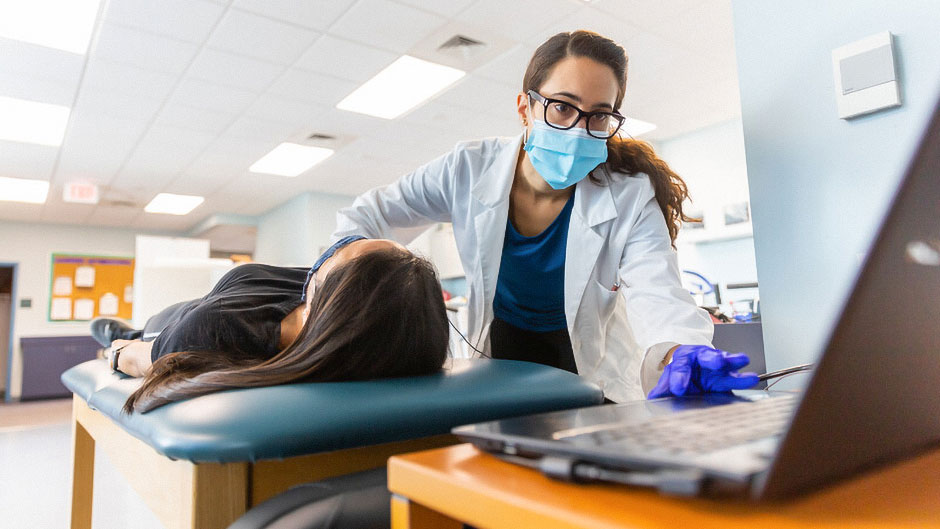Despite progress over the past several years, women’s health research is still under studied. But one doctoral student in the University of Miami School of Education and Human Development’s Department of Kinesiology and Sport Sciences is working to change that with her research project this summer.
Carolina Velasquez is working with her advisor and mentor Arlette Perry, director of the laboratory of clinical and applied physiology, to study how total body fat, abdominal fat, muscle mass, physical activity, and nutrition habits affect blood vessel health in healthy young women of different racial backgrounds.
While pursuing her master’s degree in nutrition for health and human performance at the University, Velasquez was “fascinated” by Perry’s research on health, fitness, and nutrition. This prompted the Colombian-born student to delve into research of her own once she was accepted as a doctoral candidate in 2020.
“With increasing risk of cardiovascular disease and upward trends of obesity among adults, Dr. Perry and I became very interested in conducting this study,” she said. “Not only do we hope to advance the fields of women’s health, but we particularly wanted to include underrepresented groups such as Latina and Black females.”
Velasquez’s study features innovative technology that allows for noninvasive measurements of blood vessel health with immediate results. Applicants for the research are asked to complete a questionnaire. If accepted as a participant, then an assessment is performed to determine the person’s risk for cardiovascular disease.
The doctoral student said that she hopes underrepresented groups will have access to the findings from the study and that those revelations will help increase awareness.
“As a Latina female, I found it astonishing that we are very underrepresented in the cardiovascular health field, so my work is all that much more rewarding,” said Velasquez. “My one hope for this study is to be published in a scholarly journal.”
Perry praises Velasquez for “rolling her sleeves up” and pursuing a research topic that benefits women. “She thoroughly enjoys her work, has met many wonderful women during her research, and has laid the foundation for studying a diversity of women in a very important area of cardiovascular health,” said Perry. “It’s wonderful to work with a student who has invested so much of her time and has become so skillful in using sophisticated equipment to conduct meaningful research.”
Velasquez noted that it is important to include women of different races because race plays a significant role in body composition, how fat is distributed inside the body, and risks for cardiovascular disease.
For instance, she pointed out, we know that as we age, the danger for cardiovascular disease increases. However, we also know that the risk may escalate at a younger age, especially in overweight or obese individuals. Velasquez’s mission is to provide insight into the risk a woman faces at that earlier stage.
Healthy women are needed for the study. “In my opinion, a healthy person is defined by their lifestyle,” said Velasquez. “This includes getting enough hours of sleep, exercising at least 30 minutes most days of the week, and eating a well-balanced diet,” she added. “Specifically, for this study, this means they should not have a history of high blood pressure, diabetes, high cholesterol, or cigarette smoking.”
To sign up for this study or other health research studies at the University of Miami, visit UMiamiHealthResearch.org.

